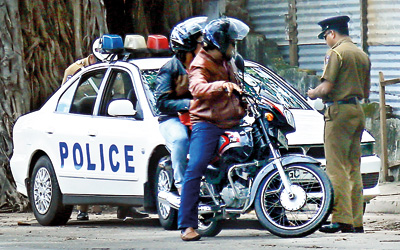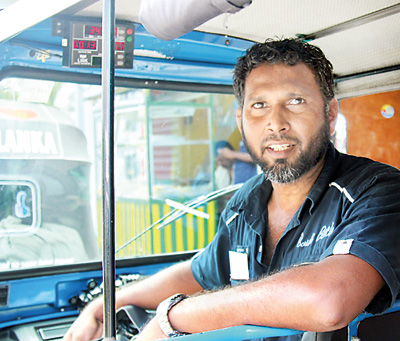News
Police traffic blitz panned by critics
Scepticism greeted plans to have almost the entire police force geared to fight traffic offences, with many claiming the scheme was a revenue-raiser and open to large-scale corruption and questioning why equal resources were not given to fighting crime.
The government defended the move, saying it would help to reduce the traffic accidents and congestion.

Almost the entire police force will now be empowered to book drivers or riders for traffic offences. Pix by Anuradha Bandara
Almost the entire police force will now be empowered to book drivers or riders for traffic offences. Although any officer was empowered to issue charge sheets, up to now only traffic police had been performing this duty. Motorists have been ignoring ordinary police and committing offences because they knew that until now those officers could not issue charge sheets, the Secretary to the Ministry of Public Order T.M.K.B. Tennekoon said.
Police will be given short-term training in imposing spot fines and the procedure to be followed, Deputy Inspector-General of Police Amarasiri Senaratne said. “More policemen will be available on the roads in traffic peak hours to impose the law. During other hours they will be able to impose these fines while they proceed with their day-to-day duties. They will not be withdrawn from other duties to be placed for traffic duties,” he said.
“They will not be deviated from their main duties,” he emphasised, in answer to concerns that police would no longer have the resources to fight crime and perform other duties. “We believe that the plan will help to reduce the traffic accidents, reduce congestion and improve road discipline,” DIG Senaratne said.
The plan has drawn mixed reactions. Former Deputy Inspector General of Police I.M. Karunaratne said that its success would depend on its implementation. “If some policemen try to take benefits from this scheme the programme will not be a success. Therefore the proper monitoring and implementation is necessary,” he said.Its main merit could be to regulate bus drivers who regularly flout the law, Mr. Karunaratne said.
He recommended testing the program for some months and discontinuing it if it was not proved effective.
The former senior Deputy Inspector General of Police Asoka Wijetilleke, who also served as DIG Traffic, believed the current force on traffic duties was sufficient but their efficiency could be improved.

M.A.R. Ameen: “The new traffic policemen do not know the traffic laws”
“Police should effectively implement laws on no parking, use of signals and following the correct lanes to reduce accidents and congestion,” he said. All-Island Private Bus Owners Association President Gemunu Wijeratne accused police of bringing in the new scheme in order to impose more fines.
“Without resolving other problems the police will falsely accuse motorists of committing offences and impose fines,” he said.
“There are instances when the buses cannot overtake due to traffic congestion and when they overtake they are blamed for cutting the centre line, but some of the outstation buses have no alternative as they need to keep to a particular time. The driver cannot be blamed.
“We will see how this scheme will be implemented and react afterwards. We’ll see if our drivers are unnecessarily harassed,” he said. All-Island Three-Wheeler Drivers’ Union Secretary T.R.R. Pally said problems would be caused by the fact that not all policemen were knowledgeable about traffic offences.
“Some of the traffic police are able to explain the offence when people are booked but police who are not knowledgeable will be at a disadvantage,” he said. He said that one of the biggest problems in Colombo was the non-availability of parking and that with the new scheme policemen would find it easier to charge people for illegal parking.
“Police will find this an easy way of making money,” he said.
Similar views came from members of the public. A.R. Janaka, 49, from Kotikawatte, said that though the scheme would reduce traffic offences it should be monitored to reduce corruption. Gunaratne Vithanage, 48, from Himbutana said that the police needed to pay attention on other areas such as crime as well to protect the ordinary citizens instead of concentrating on traffic offences. “Obviously, the government is looking for revenue from traffic offenders,” he said.
M.A.R. Ameen, 38, from Slave Island opposed the move. “The new traffic policemen do not know the traffic laws. We can imagine what the situation will be if all policemen go to book persons for traffic offences,” he said.

